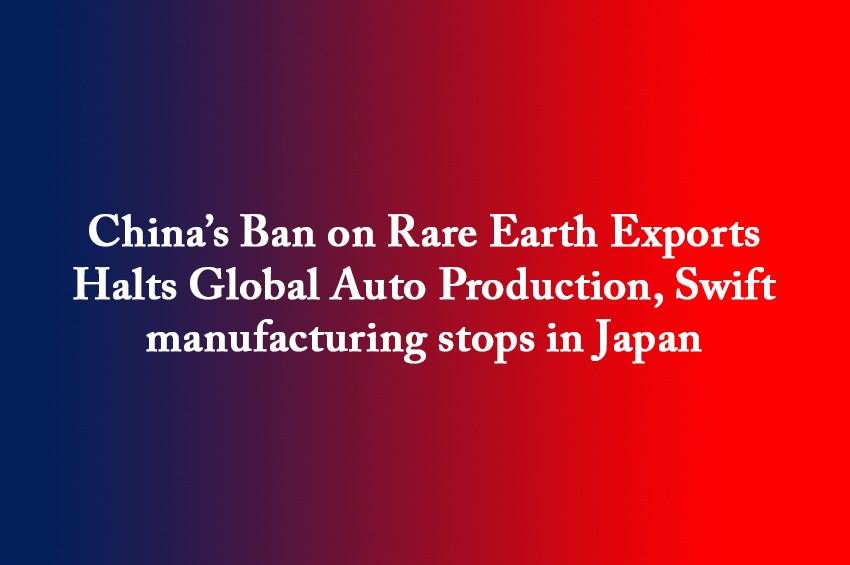Winning Bizness Desk
Mumbai. China’s decision to restrict exports of rare earth materials has started impacting the global automobile sector. Suzuki Motor Corporation, the parent company of Maruti Suzuki, has halted the production of its popular Swift model in Japan. Several European car manufacturers, including Ford, Nissan, BMW, and Mercedes-Benz, have also temporarily shut down production due to a shortage of crucial components. In response to the growing crisis, a high-level Indian delegation will visit China next week to negotiate resumption of supplies.
Swift production suspended in Japan
According to Reuters Asia, the production of the Swift hatchback was stopped on May 26, although its sports variant is still being manufactured. While Suzuki hasn’t officially cited a reason, reports indicate that the shortage of rare earth metals due to Chinese restrictions forced this decision. Nissan is in talks with the Japanese government to explore alternative supply sources. Ford also temporarily shut its Explorer SUV assembly line in Chicago by the end of May, while European suppliers have begun suspending operations. Mercedes-Benz is reviewing options to stockpile key components, and BMW has admitted that its supply chains are already under stress.
EV prices may rise if ban continues
If China maintains its export restrictions, electric vehicle manufacturers worldwide could face severe disruptions. Rare earth prices are expected to surge, potentially raising vehicle prices globally. Industry experts in India warn that if imports do not resume soon, production of both electric and internal combustion engine (ICE) vehicles may be affected. Shortages are likely to hit Indian manufacturing plants from June or July onwards.
India has limited stock, prepares to act
Indian EV manufacturers currently have a stockpile of rare earth materials sufficient for only 6 to 8 weeks, according to Business Standard. TVS Motor’s Managing Director Sudarshan Venu told CNBC-TV18 that China’s move could start affecting production by July. A delegation comprising members of the Society of Indian Automobile Manufacturers (SIAM) and Automotive Component Manufacturers Association (ACMA) will travel to China to seek faster clearances for rare earth shipments.
Vital role of rare earth materials in vehicles
Rare earth elements such as neodymium, dysprosium, and terbium are critical for producing compact and high-performance magnets used in electric motors. These elements enhance the efficiency and range of EVs. They are also used in catalytic converters in ICE vehicles and in various components like sensors and displays found in all modern cars.
China dominates global rare earth supply
China holds approximately 70% share in rare earth mining and nearly 90% in global processing. Amid rising trade tensions with the US, China has restricted the export of seven key rare metals. Special export permits and end-use certificates are now mandatory, particularly to ensure that the materials are not being used for military purposes. This strategic move is seen as China flexing its dominance in the sector.
7 Key Pointers
1. China halts export of rare earth metals used in auto production.
2. Suzuki stops Swift production in Japan due to supply shortage.
3. Ford, BMW, Mercedes, and Nissan also affected globally.
4. EV and ICE vehicle production may slow down if ban continues.
5. India has only 6–8 weeks of rare material stock left.
6. Indian auto delegation to visit China for talks next week.
7. China demands special permits for export to assert global mining dominance.


